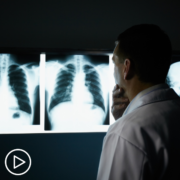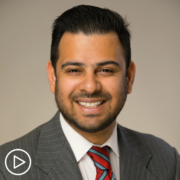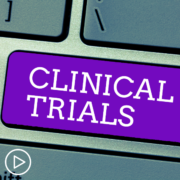Personalized Medicine | Making Lung Cancer Treatment Decisions
Personalized Medicine | Making Lung Cancer Treatment Decisions from Patient Empowerment Network on Vimeo.
Lung cancer expert Dr. Jyoti Patel explains how biomarker testing is used to guide treatment decisions and personalize care plans for patients.
Jyoti Patel, MD, is Medical Director of Thoracic Oncology and Assistant Director for Clinical Research at the Robert H. Lurie Comprehensive Cancer Center of Northwestern University. She is also Associate Vice-Chair for Clinical Research and a Professor in the Division of Hematology and Oncology at Northwestern University Feinberg School of Medicine. Dr. Patel is a leader in thoracic oncology, focusing her efforts on the development and evaluation of novel molecular markers and therapeutics in patients battling non-small cell lung cancer. Learn more about Dr. Patel.
See More from Thrive Lung Cancer
Related Resources:

|

|
Transcript:
Katherine:
Since no two people with lung cancer are the same, how do you decide which treatment is best for each patient?
Dr. Patel:
So, the process of evaluating a patient can actually take a little bit of time. So, we first meet a patient, and they may have suspicious findings. We want to understand the full stage of their cancer. And so, in 2022, that’s doing an MRI of the brain, a CT of the chest and abdomen, and often times a pet scan to look for any evidence of distant disease.
So, once we have radiographic modeling of where we think the tumor is, sometimes we need to do a repeat biopsy to confirm whether or not lymph nodes are involved or the cancer has spread. After we do the biopsy and say that it’s non-small cell lung cancer or small cell lung cancer, we make decisions about looking for genetic markers.
And so, we’ll often take the tumor tissue and stain for things like PD-L1, which is a marker of response to immunotherapies.
Very importantly, with all these new targeted therapies, we want to understand the genetic makeup of cancer. So, we want to look for things like EGFR mutations or ALK translocations which are more effectively treated with targeted therapies than chemotherapy or immunotherapy.
So, those are the tumor characteristics. But, again, I’ve said before, a tumor exists in a person.
And so, you need to understand what’s important to the person, what do they prioritize, what’s their health like, what, again, are the preferences, are there other comorbidities that could perhaps make some treatments more difficult? Many people, for example, have autoimmune disease. And so, that can be something that’s relatively minor, like some psoriasis that is well-controlled versus perhaps lupus which can cause organ failure.
Often with psoriasis there are ways that we can give immunotherapy safely. Sometimes other autoimmune diseases would put patients at very high risk with immunotherapies. And so, again, understanding the overall health, understanding other competing causes of toxicity, are absolutely important as you make decisions together.
Katherine:
Yeah. It seems like we’re getting closer to personalized medicine. For you, how would you define that term?
Dr. Patel:
Personalized medicine comes in two forms. So, one is the biologics of the tumor itself. So, what do I understand about the genetic markers, the likelihood of response to the available therapies. The other piece, again, is personalizing it to the person that has the cancer.
And so, again, what are the preferences? What are the risks they’re willing to take? What are their goals? What are the preferences?












